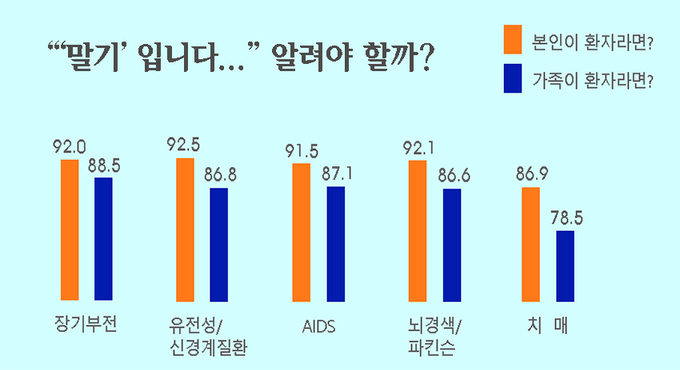–
Seoul National University Hospital surveyed 928 doctors nationwide and 1,005 general public
Compared to cancer patients, non-cancer patients and hospice use rates are 60 times less
Respecting the patient’s right to know in advance of terminal prognosis

–
It was found that most of the doctors and the general public thought that even when they became terminally ill due to a serious illness, the patient should be informed of the situation, just like cancer.
Seoul National University Hospital Department of Family Medicine Professor Oh Si-nae and Yoon Young-ho’s team presented the results of a survey of 928 doctors nationwide and 1,005 general public through thesis.

–
The research team investigated the percentage of respondents who said they wanted to know the terminal prognosis assuming they were a patient.
As a result, in the case of doctors, 99.0% of organ failure (heart failure, chronic obstructive pulmonary disease, chronic kidney disease, cirrhosis, etc.), 98.5% of neurological diseases such as incurable hereditary or amyotrophic lateral sclerosis (Lou Gehrig’s disease), acquired immunodeficiency syndrome (AIDS) ) 98.4%, cerebral infarction or Parkinson’s disease 96.0%, and dementia 89.6%.
The general public answered that organ failure was 92.0%, inherited/nervous system disease 92.5%, AIDS 91.5%, cerebral infarction/Parkinson’s disease 92.1%, and dementia 86.9%.
Compared to doctors, the general public was less likely to want to disclose their terminal prognosis. In particular, the rate that a family member should inform the patient than when he/she is a patient decreased, showing a difference of about 10%.
As a matter to consider when notifying patients about their terminal prognosis, the’right of the patient to know their condition’ was the highest at 31.6% in the survey of doctors and the general public.
Again, the general public answered that they did not want to inform the terminal prognosis because of’the patient’s psychological burden such as anxiety and depression (35.8%)’ and’the patient’s loss of hope (21.2%)’.
In Korea, in addition to cancer, hospice palliative care services for AIDS, chronic obstructive pulmonary disease, and liver cirrhosis have been started since 2017. According to the Ministry of Health and Welfare, 7,638 people died from these diseases in 2018, of which only 29 people used hospice palliative care services. The utilization rate is only 0.38%, which is very low compared to cancer, which is 22.9%.
Not only domestic but also overseas studies point out that the biggest obstacle to providing hospice palliative care for terminally ill patients due to non-cancerous diseases is not to inform patients of the prognosis and life expectancy.

–
Professor Oh Si-nae said, “It is possible to inform patients in advance of their terminal prognosis so that patients can directly participate in future treatment-related decisions such as life-sustaining care plans and use of hospice palliative care.” Research is needed.”
The results of this study were published on December 7th in the SCI-E international journal,’Journal of Korean Medical Science’.
– .


